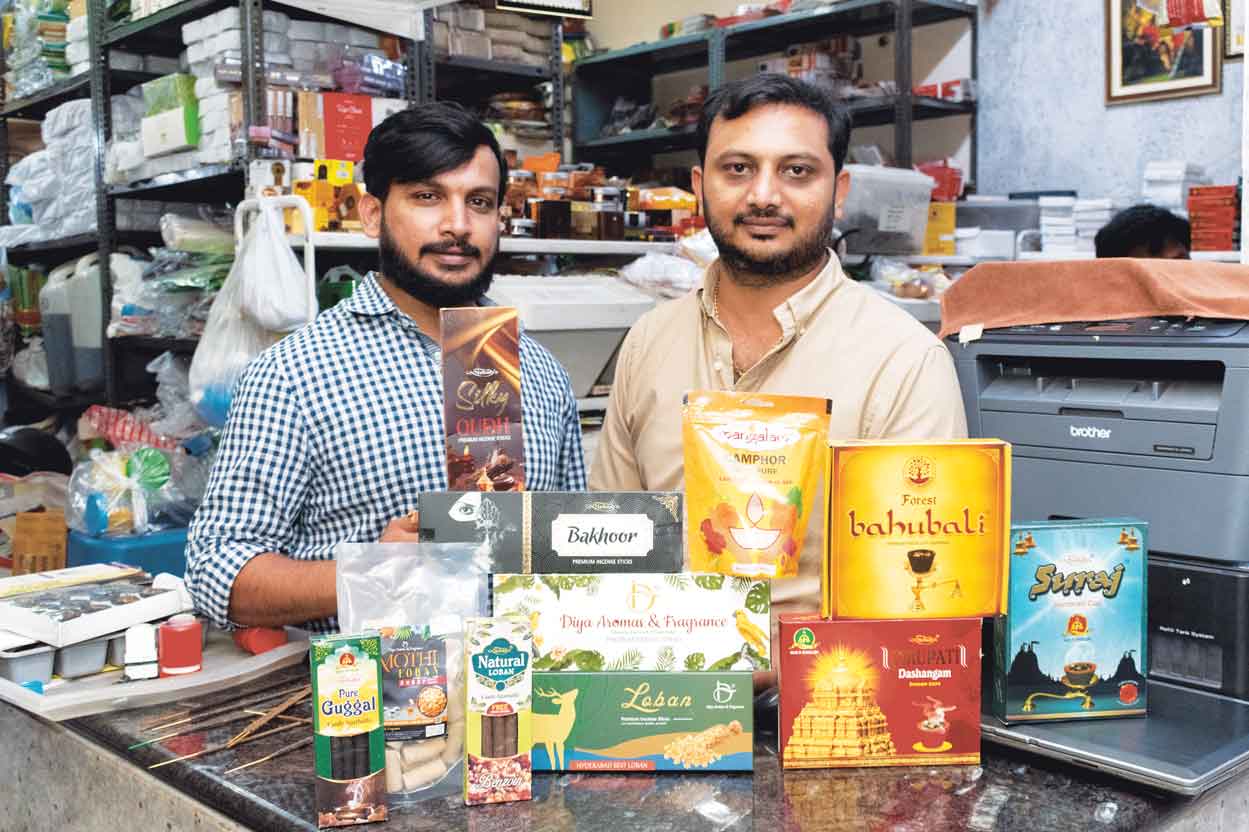
Telangana Incense Market is worth 400 crores : Rahul Busan
From top quality job work to CNF of major incense brands: Diya Aromas and Fragrance
Hyderabad based Diya Aromas and Fragrance stand out as a prominent manufacturer of high-quality incense sticks, cones, dry sticks, and sambrani, offering a diverse range of approximately 300 products. The company also undertakes job work for several large firms and acts as a C&F agent and super stockist for other notable brands such as Forest, Misbah, and Mangalam. Mr Rahul Busan, the head of Diya Aromas and Fragrance, highlighted in an exclusive interview with Sugandh India that launching and promoting a new product presents significant challenges today. Diya Aromas and Fragrance predominantly supply markets across Hyderabad, Karimnagar, Nalgonda, Warangal, and throughout Telangana, as well as in the border regions of Maharashtra, Karnataka, and Andhra Pradesh, with a network of around 30 distributors.


Diya Aromas and Fragrance is a seven-year-old company, owned by Mr Rahul Busan. He brings 25 years of expertise in the incense and fragrance industry. His family has a history of 80 years in the fragrance industry. Mr. Busan told Sugandh India that other members of his family are still into perfumery but his current focus is exclusively on incense sticks. Diya Aromas and Fragrance offer a comprehensive range of incense products, including benzoins, loban, guggul, sambrani, dhoop, flora and masala incense, cones, and dry dhoop. They also do job work for various other companies. Their products are available in packs starting from 100g. Their products are sold between ₹80 and ₹8000 per kilogram— all made from natural ingredients. Mr Busan also has a one of a kind incense shop in Secunderabad.
In response to a question from Sugandh India, he said that back then, there was no distinct segmentation of incense products into premium, medium, and economy ranges. incense sticks were simply sold as incense sticks and were priced at an economic rate. He mentioned that in Hyderabad, there used to be a major market for the Metro brand. Then, Cycle Pure entered the market and quickly became a popular brand, followed by ZED Black. He said “, Initially, our family traded in both Bharat and Z Black products. Later, my brother Mithlesh Busan and I started our venture and introduced several products. We also became C&F agents and super stockists for Forest and Misbah.” He noted that apart from other products, he also does job work for premium-quality sambrani products. Additionally, Diya brand’s loban is very popular, with a high demand for Moti loban. We also offer seven to eight varieties of Oud. The company produces across all segments and works on a company-to-company basis for job work. We have 7-8 warehouses, and the work for our products is managed separately.


“Incense sticks are more in demand than dry dhoop sticks, dhoop, sambrani, and cones,” mentioned Mr Busan. Agarbattis holds 75% of the market share. The remaining is for Dhoop and other products. Mr Busan informed Sugandh India, “Bakhoor, which is considered premium in the industry (sense) enjoys six to seven per cent of market share,” In response to a question, he stated that the market for premium products is growing at a rate of 30%, while the market for economy products is around 50%. Brands like ZED Black, ITC, and Cycle Pure are popular in the economy segment. Cycle Pure also has loads of premium brands. He endorsed that Cycle Pure has become such a well-established brand that no other company can manage to compete with it. Cycle Pure’s Woods is of exceptional quality. He also noted that bamboo-less products have a market share of 5-10%. Wet dhoop is down in the list with a market share of just three to four per cent.
In response to a question, he said that challenges are many in the trade. Production is good during the hot season though market consumption is low during that season. The market is riddled with too many players. Some new agarbatti product pops up now and then. Buying behaviour doesn’t allow the sale of newer incense products. Debutants (manufacturers) often flood the market with cheaper products. This doesn’t help them. The retailers dump them back to wholesalers/distributors. When asked how he manages his premium products alongside brands like Forest and Misbah, he explained that customers demand quality, and they choose products based on the quality offered. You can only advise a customer once or twice, but if the product is not good, it will not succeed.
He noted that Ajmal’s bakhoor is the most popular. Mr Busan informed that they also have their own bakhoor and Misbah’s also performs well. Hansraj from Nagpur is notable for its expertise in loban, which has a strong market in Telangana and Maharashtra. He added that the future of incense sticks across the country looks promising, particularly in Telangana, where it is growing rapidly. The market in Telangana is around ₹400 crore, with Hyderabad alone having a market of over ₹80 crore.

In response to a question from Sugandh India, Rahul Busan stated that the most popular brands in the market are Cycle Pure, Z Black, Forest, Mangaldeep, and Darshan. Additionally, other brands that offer quality products also sell well. He mentioned that economy products are more popular here, while zippers have a lower demand, with only those priced at ₹75 MRP being sold. He noted that in wet dhoop, the most popular brands are Hari Darshan and Z Black. For sambrani cups, Tamil Nadu’s GT , Cycle Pure’s Naivedya, Forest’s Baahubali, Misbah, and Diya (their brand) are preferred for their quality and low prices. Regarding camphor, he said that Swastik is the most popular. Mangalam has a premium market. Similarly, for roll-on and attar, brands like Al Nuaim, Arochem, and Nemat are popular. In sandalwood tika, several varieties are available, but products from companies like Bhawani Ashtagandha and Pune’s Manohar are well-regarded.



